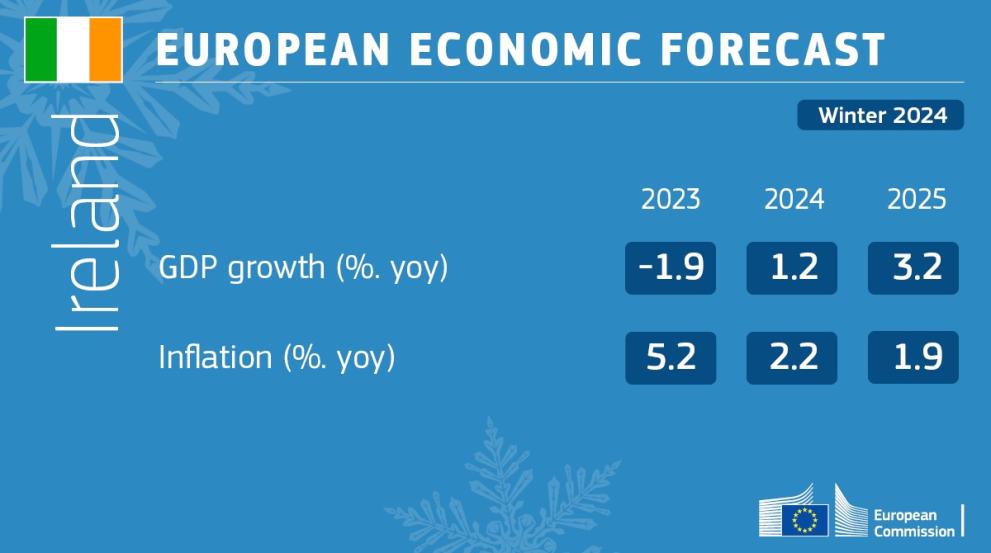
Ireland's GDP growth outlook in 2024 has been adjusted down substantially to 1.2% compared to 3.0% in the Autumn Forecast, mainly reflecting a lower-than-projected carry-over from 2023. In 2025, economic activity is expected to expand by 3.2%, slightly lower than in the Autumn 2023 Forecast. Overall inflation in Ireland is projected at 2.2% in 2024 and 1.9% in 2025, lower than forecast in autumn.
The Commission estimates that following subdued growth last year, the EU economy has entered 2024 on a weaker footing than expected. The Winter Interim Forecast revises growth in both the EU and the euro area down to 0.5% in 2023, from 0.6% projected in the Autumn Forecast, and to 0.9% (from 1.3%) in the EU and 0.8% (from 1.2%) in the euro area in 2024. In 2025, economic activity is still expected to expand by 1.7% in the EU and 1.5% in the euro area.
Inflation is set to slow down faster than projected in the autumn. In the EU, Harmonised Index of Consumer Prices (HICP) inflation is forecast to fall from 6.3% in 2023 to 3.0% in 2024 and 2.5% in 2025. In the euro area, it is expected to decelerate from 5.4% in 2023 to 2.7% in 2024 and to 2.2% in 2025.
Commissioner for Economy Paolo Gentiloni said:
The European economy has left behind it an extremely challenging year, in which a confluence of factors severely tested our resilience. The rebound expected in 2024 is set to be more modest than projected three months ago, but to gradually pick up pace on the back of slower price rises, growing real wages and a remarkably strong labour market. Investment is expected to hold up, buoyed by easing credit conditions and the flow of RRF funding. In 2025, growth is set to firm and inflation to decline to close to the ECB’s 2% target. Geopolitical tensions, an ever more unstable climate and a number of crucial elections around the world this year are all factors increasing the uncertainty around this outlook.
Growth to regain traction in 2024 after a weak start to the year
In 2023, growth was held back by the erosion of household purchasing power, strong monetary tightening, the partial withdrawal of fiscal support and falling external demand. After narrowly avoiding a technical recession in the second half of last year, prospects for the EU economy in the first quarter of 2024 remain weak.
However, economic activity is still expected to accelerate gradually this year. As inflation continues to abate, real wage growth and a resilient labour market should support a rebound in consumption. Despite falling profit margins, investment is set to benefit from a gradual easing of credit conditions and the continued implementation of the Recovery and Resilience Facility. In addition, trade with foreign partners is expected to normalise, after a weak performance last year.
The pace of growth is set to stabilise as of the second half of 2024 until end-2025.
A faster-than-expected decline in inflation
The decline in headline inflation in 2023 was faster than expected, largely driven by declining energy prices. With activity stalling, the easing of price pressures in the second half of last year broadened to other goods and services.
Lower-than-expected inflation outturns in recent months, lower energy commodity prices and weaker economic momentum set inflation on a steeper downward path than anticipated in the Autumn Forecast. In the near term, however, the expiry of energy support measures across Member States and higher shipping costs following trade disruptions in the Red Sea are set to exert some upward price pressures, without derailing the process of declining inflation. By the end of the forecast horizon, euro area headline inflation is projected to post just above the ECB target, with EU inflation a notch higher.
Increased uncertainty amid geopolitical tensions
This forecast is surrounded by uncertainty amid protracted geopolitical tensions and the risk of a further broadening of the conflict in the Middle East. The increase in shipping costs in the wake of the Red Sea trade disruptions is expected to have only a marginal impact on inflation. Further disruptions could, however, result in renewed supply bottlenecks that could choke production and push up prices.
Domestically, risks to the baseline projections for growth and inflation are linked to whether consumption, wage growth and profit margins underperform or outperform expectations, and to how high interest rates remain, for how long. Climate risks and the increasing frequency of extreme weather events also continue to pose threats.
More Information:
Details
- Publication date
- 15 February 2024
- Author
- Representation in Ireland
